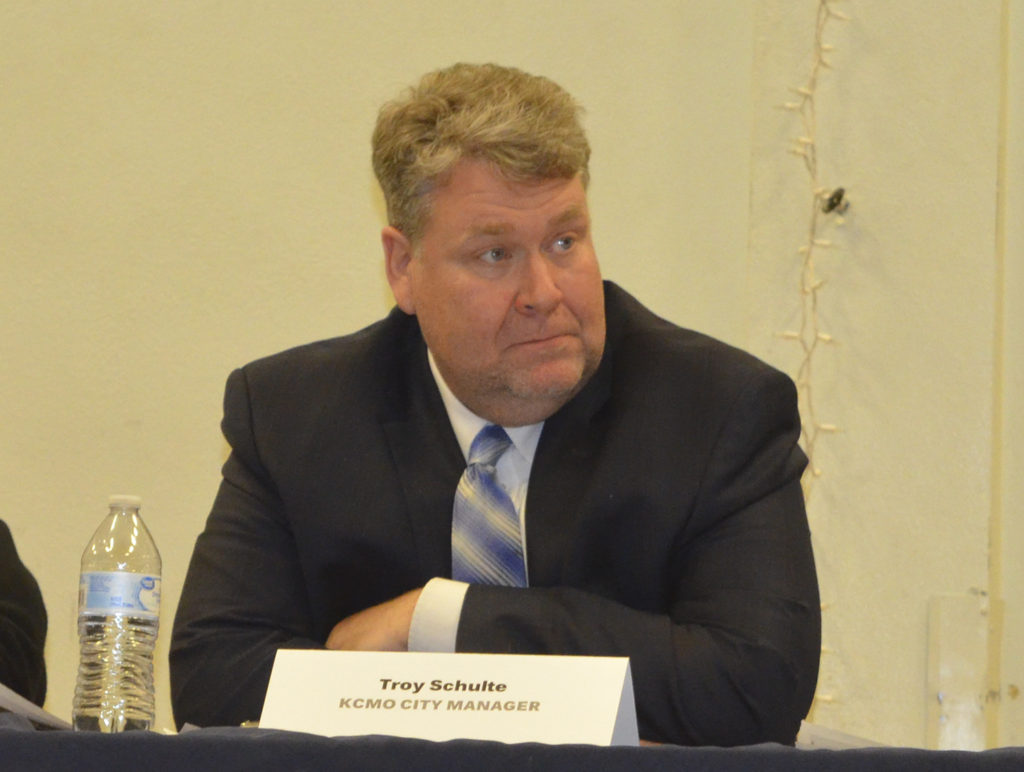
Paul Thompson
Northeast News
The KCMO City Council worked to combat recidivism rates and set up a vote to limit the power of the City Manager’s office to enter into contracts without Council approval during a busy gathering of the Transportation and Infrastructure committee on Thursday, January 25.
Third District Councilman Quinton Lucas reintroduced Ordinance No. 170963, which would reduce the amount of money that the City Manager could spend on city contracts without Council approval to $750,000, while also limiting those under the scope of professional service contracts to $50,000. Lucas suggested that the ordinance would provide greater transparency and offer the City Council increased authority over ongoing expenses at City Hall.
“I am confident that the majority of the Council supports the ordinance as I’ve drafted it,” Lucas said after the committee passed the measure to the full Council without a recommendation. “We have right now six co-sponsors, myself included, but I’ve had a majority of the Council express support for this ordinance and support of its transparency goals.”
Originally the committee had proposed a motion to hold the ordinance in committee for two weeks, but without a second, Lucas intervened to suggest that the legislation be passed on to the full City Council.
“This has been talked about for months and months,” Lucas said. “Look, I appreciate a hold when it looks like we’re going to be doing more work. When someone wants to defeat an ordinance, though, I would just encourage us to have an up or down vote.”
Second District Councilman Dan Fowler suggested that Sunshine Law inquiries into city contracts can be filed by all citizens, but Lucas pointed out after the meeting that not every Kansas City resident understands how that process works.
“I do differ with Councilman Fowler’s view: a Sunshine Act request is not easy – it costs money, you have to know where to send it to, you have to go through more work,” Lucas said.
In making the case for his ordinance, Lucas brought intern Joel Thompson before the committee to testify about research he’d conducted on City Manager contract limits from comparable cities. Thompson noted that Kansas City saw a noticeable spike in City Manager spending limits during the early 2000s. Currently, the City Manager’s office can enter into a construction contract of up to $1.3 million without City Council approval.
“Between 2000 and 2005 there was a very dramatic increase of over a million dollars in five years,” Thompson noted.
Thompson further testified that the threshold for construction contracts without Council approval in the city of Portland is $500,000, Denver is $500,000, and Sacramento and Charlotte are under $200,000. For professional service contracts, Kansas City has seen a similar spike in the spending threshold since the year 2000.
“In 2000 it was $50,000, and now we’re at $400,000,” Thompson said.
Thompson’s research also suggested that in a $75 million professional services sample from 2016-2017 budget, roughly $25 million in contracts were awarded through City Manager and department directions that were not subject to City Council approval.
As written, Ordinance No. 170963 would allow a contract to be increased by up to 10% through a change order, assuming Council authorization had previously been obtained. The ordinance would also ask the City Manager to file quarterly reports with the City Clerk, detailing “all contracts authorized with consideration in excess of $20,000 for professional services contracts and $160,000 for all other contracts” during the period.
The committee also discussed the citywide expansion of its ‘Ban the Box’ policy during the lengthy meeting. Back in 2013, the City Council voted to eliminate the box on City job applications that asked about criminal history.
On Jan. 25, 3rd District Councilman Jermaine Reed pushed legislation that would expand the ‘Ban the Box’ policy citywide, removing the criminal history questions from employment and housing applications. Reed argued that the measure will provide better job prospects for previously incarcerated individuals while reducing recidivism rates in Kansas City.
“My leadership on this issue is rooted in my desire to assist those with criminal records who suffer from pervasive discrimination in many areas of life including employment, housing, education, and eligibility for many forms of social service benefits,” Councilman Reed said. “People with criminal records represent a group of job seekers who are ready to contribute and add to the workforce. Research has shown that there is a direct correlation between recidivism and unemployment. People who are employed are significantly less likely to be re-arrested.”
Paul Pierce of the City’s Human Relations department testified that the City policy has “had absolutely no negative impact” on City operations since it was instituted in 2013.
Under the proposed ordinance, current extenuating circumstances under state law – such as rules prohibiting individuals with history of violence against children from working with kids – will still apply. If passed, June 9 would be the effective date for the ordinance, which gives the City a chance to inform the community about the policy.
Public testimony on the ordinance was largely positive, though Jason Pryor of the Restaurant Council suggested that the ordinance doesn’t address a major issue for restaurants: that convicted felons cannot be granted liquor cards in Kansas City, Missouri. That fact, Pryor suggested, prevents those individuals from serving alcohol at restaurants, limiting opportunities for promotions.
“I think it does waste the person’s time – the employer and the interviewee,” Pryor said. “Nobody, really in any industry, wants to go out and hire somebody who is not promotable.”
Bill Teel, Executive Director of Greater Kansas City Restaurant Organization, asked the City Council to go a step further.
“We shouldn’t just ban the box; we should eliminate liquor cards,” Teel said. “Liquor cards serve no meaningful purpose, and inhibit opportunities.”
Mark Byrd, President and Founder of New Reflections Technical Institute, testified in favor of the ordinance. Byrd described his experiences working with previously incarcerated individuals, suggesting that the prospect of finding employment can provide a source of much needed hope.
“One of our main focuses is to work with those who have been incarcerated,” Byrd said. “When we speak of recidivism, most people go back for lack of hope.”
The committee substitute was passed unanimously through committee. It will be heard by the full City Council on Thursday, February 1.



















